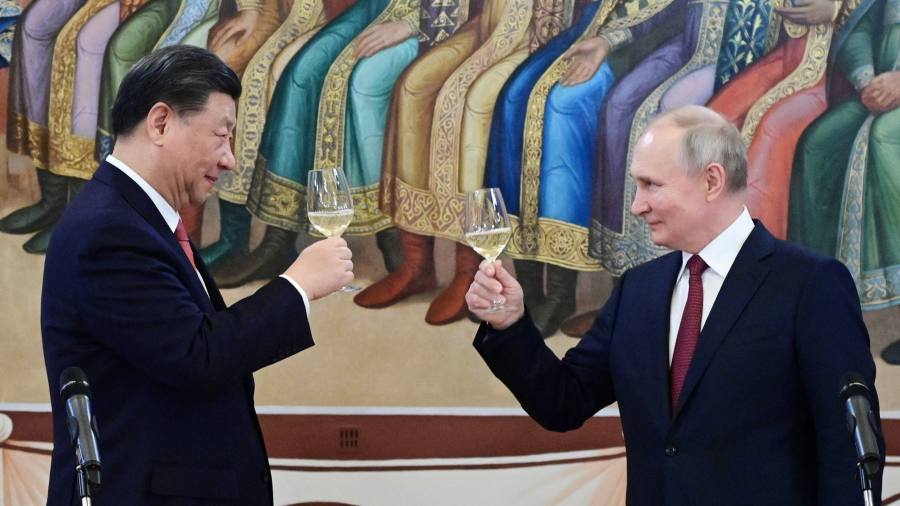Whereas Xi Jinping was being acquired with nice pomp and ceremony in Moscow final week, Fumio Kishida was 500 miles away in Kyiv.
The truth that the president of China and the prime minister of Japan paid simultaneous and competing visits to the capitals of Russia and Ukraine underlines the worldwide significance of the Ukraine struggle. Japan and China are fierce rivals in east Asia. Each international locations perceive that their battle can be profoundly affected by the result of the battle in Europe.
This shadow boxing between China and Japan over Ukraine is a part of a broader pattern. Strategic rivalries within the Euro-Atlantic and Indo-Pacific areas are more and more overlapping with one another. What’s rising is one thing that appears increasingly more like a single geopolitical battle.
Xi’s go to to Moscow has confirmed what the Harvard professor Graham Allison calls the “most consequential undeclared alliance on this planet” — a Russia-China axis that stretches throughout the Eurasian landmass. Moscow and Beijing are drawing nearer to Iran and likewise backed the “reliable and cheap considerations” of North Korea within the joint assertion they issued final week.
Ranged towards the Russia-China alliance is a gaggle of democracies carefully allied to the US. That is anchored by Nato within the Euro-Atlantic space and by America’s treaty allies within the Indo-Pacific, with Japan foremost amongst them.
The Biden administration is encouraging a tightening of hyperlinks between America’s Asian and European allies. Final yr, Japan, South Korea, Australia and New Zealand attended a Nato summit for the primary time. At that assembly, Nato broke new floor by explicitly figuring out China as a risk to the alliance’s “pursuits, safety and values”. The identical 4 Indo-Pacific international locations will attend a Nato summit in Lithuania in July.
All this has been observed with displeasure in Moscow and Beijing. Final week’s Russian-Chinese language assertion expressed “severe concern over Nato’s persevering with strengthening of army safety ties with Asia-Pacific international locations”. It additionally explicitly condemned Aukus, the brand new safety pact between Australia, the UK and the US.
The assertion blamed all these strikes on America’s “chilly struggle mentality”. However Xi and Putin’s tendency to see the US because the puppet grasp behind all the pieces could also be blinding them to the way in which during which their actions have alarmed the democracies of Europe and Asia.
There’ll quickly be a flurry of visits by European leaders to Beijing to check the place China actually stands on Ukraine. However Xi is unlikely to present the presidents of France and the European Fee something greater than heat phrases.
The Japanese authorities sees Putin’s assault on Ukraine as proof that authoritarian powers are on the march. They concern {that a} Russian victory in Ukraine may embolden China of their area. As Kishida put it on a visit to Britain final Might: “Ukraine is perhaps east Asia tomorrow.”
Earlier this yr, Japan introduced a 26.3 per cent improve in defence spending. Kishida’s go to to Ukraine was a dramatic step for Tokyo: the primary time since 1945, a Japanese prime minister has visited a struggle zone.
The emergence of two rival world blocs has sparked inevitable discuss of a brand new chilly struggle. There are clear echoes of that battle with a Russia-China alliance as soon as once more squaring off towards a US-led coalition of democracies — whereas a big group of non-aligned nations, now labelled the “world south”, hovers on the sidelines.
Nonetheless, these is an excellent gloomier historic parallel, which I discover extra compelling — and that’s with the rise in worldwide tensions within the Nineteen Thirties and Nineteen Forties.
Then, as now, two authoritarian powers — one in Europe and one in Asia — had been deeply unhappy with a world order they considered unfairly dominated by the Anglo-American powers. Within the Nineteen Thirties, the dissatisfied nations had been Germany and Japan. The Asahi newspaper summarised the official view in Tokyo when it complained, in 1941, that the US and the UK had been imposing a “system of world domination on the premise of Anglo-American world views”. Modern variations of that criticism are actually made frequently on Russian state tv or in China’s International Occasions.
In his e-book, Fateful Selections, the historian Ian Kershaw data how Imperial Japan reacted to the outbreak of struggle in Europe: “It was within the wake of Hitler’s astonishing army triumphs in western Europe that Japan, looking for to take advantage of the weak point of those international locations, took the fateful selections to increase into south-eastern Asia.” That selection quickly led Japan right into a struggle — not simply with Britain, France and the Netherlands — but additionally with the US.
Had Putin’s Russia additionally scored an “astonishing army triumph” and brought Kyiv in three days, Xi might need drawn comparable conclusions in regards to the weak point of western energy in Asia and determined that the time was ripe for radical change.
However the hazard of a slide into world battle is way from over. The outbreak of struggle in Europe, mixed with the rise in tensions in east Asia — and the rising connections between these two theatres — nonetheless has distinct echoes of the Nineteen Thirties. All sides have a accountability to guarantee that, this time, linked rivalries in Europe and Asia don’t culminate in a worldwide tragedy.

